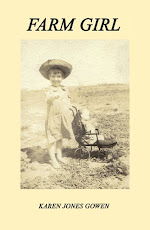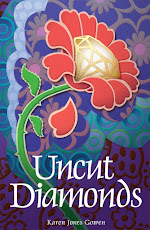The Story and The Person:
When sharing family history, there are two elements of the utmost importance: The Story, and The Person.
Everyone loves a story. Children who roll their eyes and say, “Oh no, not again,” when parents and grandparents try to tell them a moral or lesson learned based on their own lives, will listen eagerly and learn readily when the lesson is clothed in the robes of the story.
Stories have a beginning, a middle and an end. Stories have characters- people or animals that others can relate to. They connect the storyteller and the listener through shared emotion. Sometimes they are sad, sometimes suspenseful, sometimes funny. But always a story will cause us to feel something, and to be a better person for the experience. We improve our storytelling skills, either spoken or written, through practice.
The other important element is the Person. When I put my mother’s stories together, I noticed the sound of the young Nebraska farm girl. I could hear her voice. When my kids read the book, they said, “It sounds just like Grandma. It is like knowing Grandma as a little girl.”
Family history stories shared with our children can help them to see their grandparents in a whole new light. We could always see pictures of my mother as a young girl in the 1920's, but now we have her voice. We hear her talking about her mom and her dad, the country school she attended through 8th grade, her description of the dust bowl days, how she felt about the changes brought to that area by the Great Depression.
It was important for me to keep that voice true in the narrative, so I kept it in first person, and I kept her way of talking. She wanted me to correct some of the grammar, or to rewrite certain phrases, and I said, “No, Mom, this sounds like a Nebraska farm girl. We don’t want it to sound like an English teacher.”
And she said, “Oh, who would want to read about that silly little girl.”
Lots of people, because that silly little girl came alive in the book. The reader can hear her voice, and gets insight into her personality and character, and the fact that she is kind of spoiled and flighty endears her to us. Because if I had portrayed her as a perfect little girl, she wouldn’t seem real, since no one is perfect.
Values of Preserving Memories through Writing:
Writing preserves the life and the memories of the person’s history, and then it becomes a time traveling experience to the reader.
It allows you to know and to learn from someone you’ve never met.
When we look up from our lives and want to treasure the moment, writing preserves these moments to be treasured and relived by you and your posterity and others as well.
Writing Exercises that Awaken Creativity and Preserve Memories:
You have to start somewhere, and that might be just sitting down and writing for five minutes on any given topic. Perhaps a word you find in the headline of a newspaper, like airplanes, economy, France, peace, soldiers. This exercise will open doors to creativity, stimulate ideas, and get you over your fear of writing.
They can also work for children, giving them one word topics and having them write for 2-5 minutes, then have them read what they wrote without criticism. Try words like animals, purple, fuzzy, pumpkins, feet, or have them come up with their own choices. There are certain rules to this exercise.
#1. NO COMMENTS OR CRITICISM! Even comments can be damaging, as one child’s work might elicit enthusiastic praise and the response to another, less enjoyable piece of writing might be “Oh, that’s good, too.” Kids can see through the comments, so better to not say anything.
#2. The writing can take any form they desire, such as a song, a poem, or just a list of words, or a little short story. The idea is to stimulate creativity, not to stifle it.
How do we go from these simple writing exercises to preserving memories? One woman wanted to write her memories of her mother. She set the goal of one page, but once she got going, she ended up with three typed pages. Her sister read the pages, and they both cried together, remembering their mom who had passed on. Setting small goals can get us started on the path to preserving our precious memories before they fade away.
Subscribe to:
Post Comments (Atom)












This is really precious KarenG
ReplyDeleteYou are so right! Your GM, in Farm Girl, is a great example...
ReplyDeleteThese are fab exercises for any type of writing! Thank you! I really like the writing exercises for children - great ways to stimulate imagination and the love of words! Take care
ReplyDeletex
I remember rolling my eyes when my mother would try to tell me about relatives and things that happened. She's been gone 17 years and boy, do I wish now I'd listened. She was the oldest in her family and none of her brothers remember the stories she was trying to tell me.
ReplyDeleteMason
Thoughts in Progress